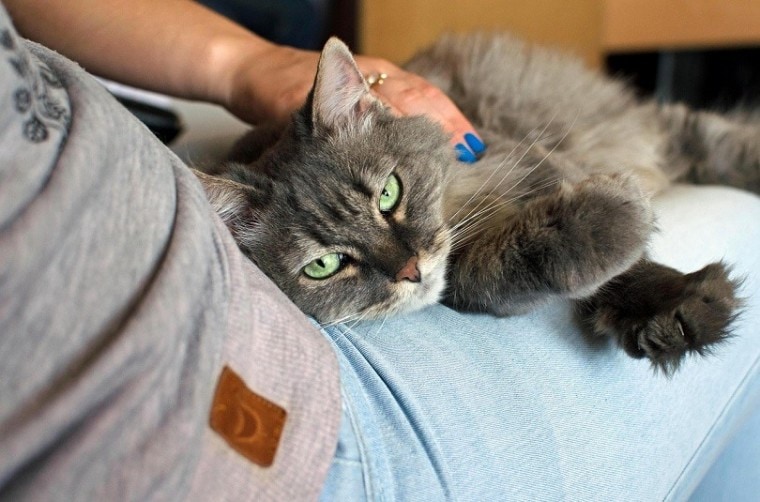
Click to Skip Ahead
Cats have a reputation for being aloof and independent. In reality, they can show a lot of affection, enjoy being with their humans, and form strong bonds with them. There are times when cats even feel jealous if another pet or something else takes their human’s attention away from them. So yes, cats can get jealous.
It’s important to be attentive to a cat’s behavior, especially if there are sudden changes. These behaviors are often signaling an underlying issue, such as jealousy.
Jealous behaviors can be challenging and frustrating at times for cat owners. That’s why we have this guide to help you navigate these challenging situations. We’ll go over different types of jealous behaviors and how to address them.
The 5 Types of Jealous Behaviors in Cats
Cats tend to display jealousy through five common behaviors. When your cat exhibits these behaviors, always look for context clues to see if they’re jealous responses or if something else is causing them.
1. Aggression
Cats can turn to aggressive actions and behaviors when they’re experiencing jealousy. Right before they engage in aggression, they’ll usually thrash their tail back and forth as a warning signal.
Cats can also start to hiss or yowl. Then, they may begin to swat or scratch. If further provoked, they can end up biting.
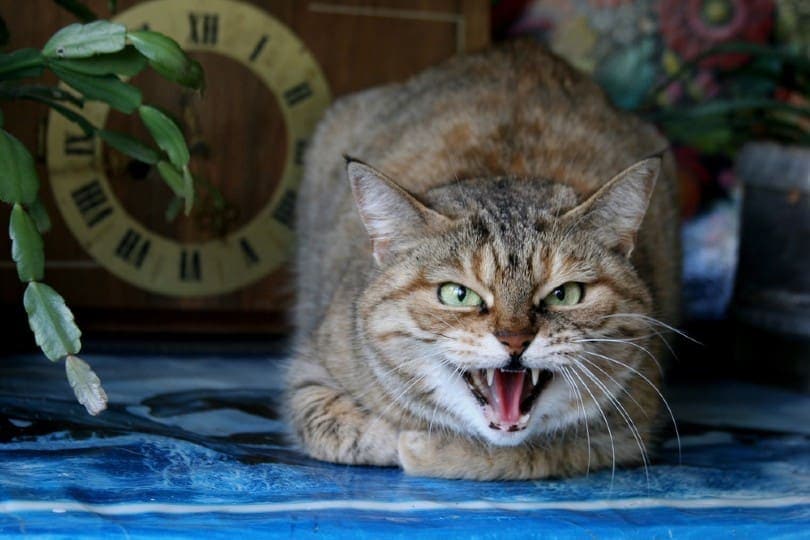
2. Blocking You from the Object of Jealousy
A jealous cat can also try to get in between you and the thing that’s making them feel jealous. For example, some cats may walk all over your keyboard while you’re on your laptop because they believe the laptop is getting way too much attention from you.
Cats may also stand in your way so that you can’t walk any closer to any other object or pet.
3. Urine Marking
Urine marking often occurs when a cat feels territorial and threatened. Therefore, urine marking is a common occurrence when you introduce a new cat to the home. Spayed and neutered cats may be less likely to mark areas with urine, but they’re not entirely exempt from displaying this behavior.

4. Depression
Cats can feel and develop depression if they experience prolonged jealousy.
Also, make sure to pay attention to your cat’s body language.
5. Fawning
Fawning is what cats do to try to get your attention. They may rub themselves against you or weave in between your legs excessively. They might also purr and meow more than usual. Your cat may also want to play with you more frequently.

The 3 Reasons Cats May Show Jealous Behaviors
It’s important to identify jealous behaviors, but it’s just as important to find the underlying cause or trigger for these behaviors. Consider the following reasons that might trigger your cat to feel jealous.
1. Your Attention Becomes Divided
If your cat is used to receiving a lot of attention from you, and that attention suddenly gets taken away, they’ll most likely let you know that they feel displeased. One significant cause of divided attention is when you experience changes in your own lifestyle.
For example, if you recently got a new job, more of your attention and energy may go towards learning how to adjust to your new job. As a result, you might play with your cat less often because you’re exhausted after a long day of learning new skills.
It’s important to remember that cats get accustomed to the regular amount of attention they receive from their owners. Therefore, if they don’t receive that same amount, they’ll notice it and may start to feel jealous.
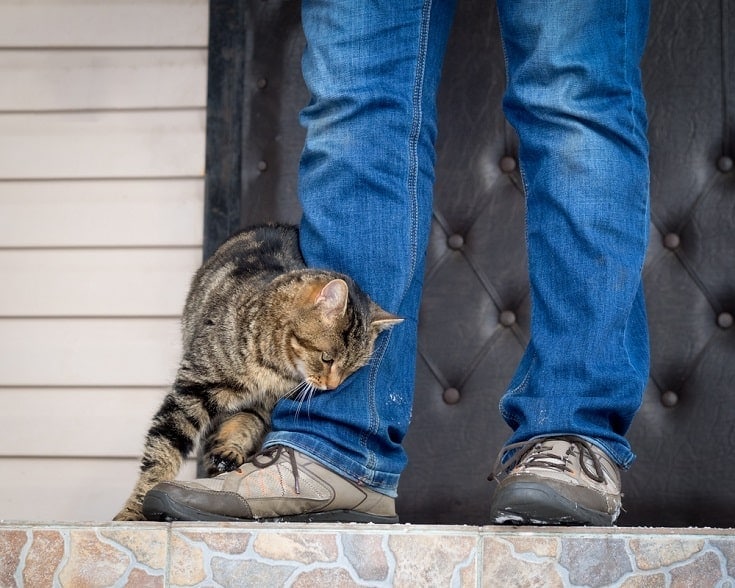
2. Changes in Your Cat’s Routine
Cats are creatures of habit that like sticking to their routine. Therefore, if you change their routine, it’ll most likely be a challenge for them to adjust to new things.
One significant change that many cats have trouble adjusting to is the number of hours their owners are outside of the house. If you suddenly start leaving the house for longer periods, your cat will notice and may start to feel lonely. If this loneliness doesn’t get addressed, it can develop into jealousy and depression.
3. Sharing Personal Items
Another common cause of jealousy is the introduction of a new cat or another pet into the home. Cats are territorial, so they may not always like other animals in the house.
Cats also don’t tend to like sharing their items, such as cat trees, perches, and litter boxes. If a cat suddenly has to share items they consider as their own, they can react with aggression and urine marking.
The 5 Ways to Address Jealous Behavior
The first thing you want to do is identify the trigger. Try to figure out when the jealous behavior first started occurring. Then, look for different changes that happened during that time that you can connect to your cat’s jealous behaviors.
Once you identify the trigger, you can take steps to help your cats adjust to change or feel secure enough to let go of the need to feel jealous. Depending on the trigger, here are some things you can do to help a cat with jealousy.
1. Create More Space for Your Cat
If your cat feels jealous of another cat, pet, or a new baby, create more personal space for them. Separate your cat from the baby or other pet in different rooms.
Just keep in mind that if your cat used to have free reign of the house, you don’t want to suddenly reduce their space to one private room. Instead, do your best to keep the new pet in a private room so that your cat doesn’t feel like they’ve lost their territory.
If you brought home another cat, try to have separate items for each cat. For example, each cat should have their own litter box, bed, drinking bowls, and toys.
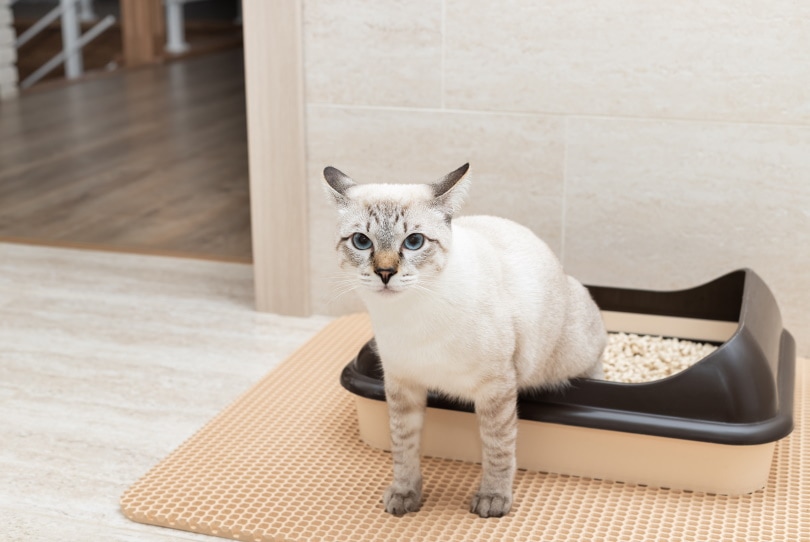
2. Make Changes Gradually
The best way to minimize a cat’s jealousy is to introduce change gradually. If you’re bringing home a new pet, keep them in separate rooms. You can slowly introduce them to each other for a few minutes at a time and incrementally increase the time they spend together until they’re completely used to each other.
If you know that you have to leave your house for long hours, try to gradually increase the number of hours you’re out of the house in half-hour increments. Slowly build up to the actual amount of time you have to be gone so that your cat doesn’t notice or experience a significant change.
If you’re moving to a new home, bring your cat to the new space a couple of times before you completely move in. Put some of your cat’s items in the new home during these visits so that your cat notices familiar items in the home.
3. Make Time to Show Your Cat More Affection
If your cat craves attention from you, block out space in your schedule to play together. It’s best to pay attention to your cat before they start to fawn. If you only show attention to your cat when they ask for it, it’ll develop into an unwanted habit.
Cats can help us to remember to take a break from work. Therefore, their want for attention can be good for you as well.
If you’re working from home, use playtime with your cat as a break time. Breaks are important and can even significantly improve your work life. They help you release stress, feel refreshed and ready to return to work, and reduce burnout.
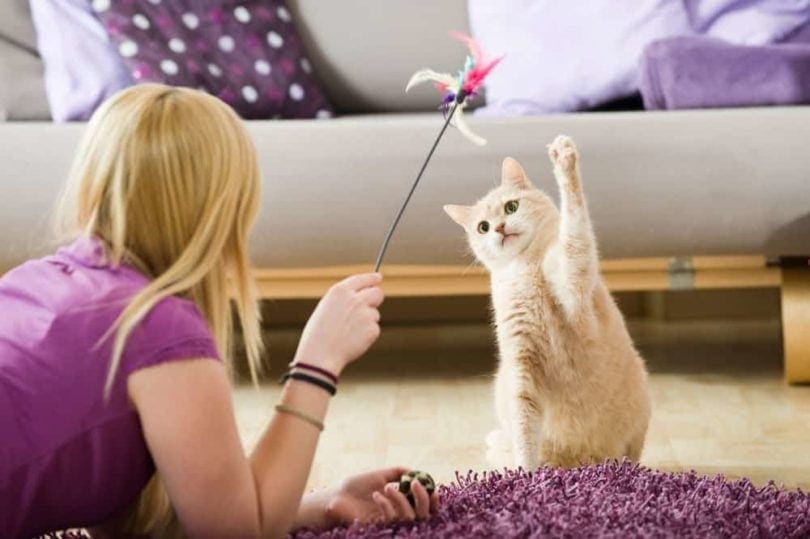
4. Use Interactive Toys
Cats can feel jealousy more quickly if they’re bored. Try to introduce them to interactive toys that will tire them out. There are plenty of automatic toys that can keep your pet occupied while you work or aren’t home.
If your cat enjoys catnip, you can sprinkle catnip on these toys so that they get a nice reward as they play with them.
5. Give Your Cat Time to Accept Changes
Transitions can be difficult for anyone, so it’s important to show a lot of patience when your cat experiences significant changes.
There are instances when you do everything by the book, but your cat will still show signs of jealousy. Sometimes, time just needs to pass for your cat to adjust to changes fully.
If your cat’s jealousy gets to a point where it’s causing significant stress to other family members, don’t hesitate to reach out to a cat behaviorist or trainer. These specialists can help you better understand your cat, provide a customized plan to help you, and give you the support you need to get through a challenging experience with your cat.
Final Thoughts
Cats may not be the most social animals, but they can feel emotional distress when they experience changes in their routine.
If you suspect that your cat feels jealousy, make sure to identify the trigger first. Then, make the appropriate changes to either eliminate the trigger or help your cat adjust to the new change.
Jealous behaviors can be challenging, but they’re actions that your cat makes to communicate with you. As you learn more about behaviors, you’ll come to understand your cat better, and your bond will only strengthen as you work through them together.
See also:
Featured Image Credit: zavalnia, Pixabay







